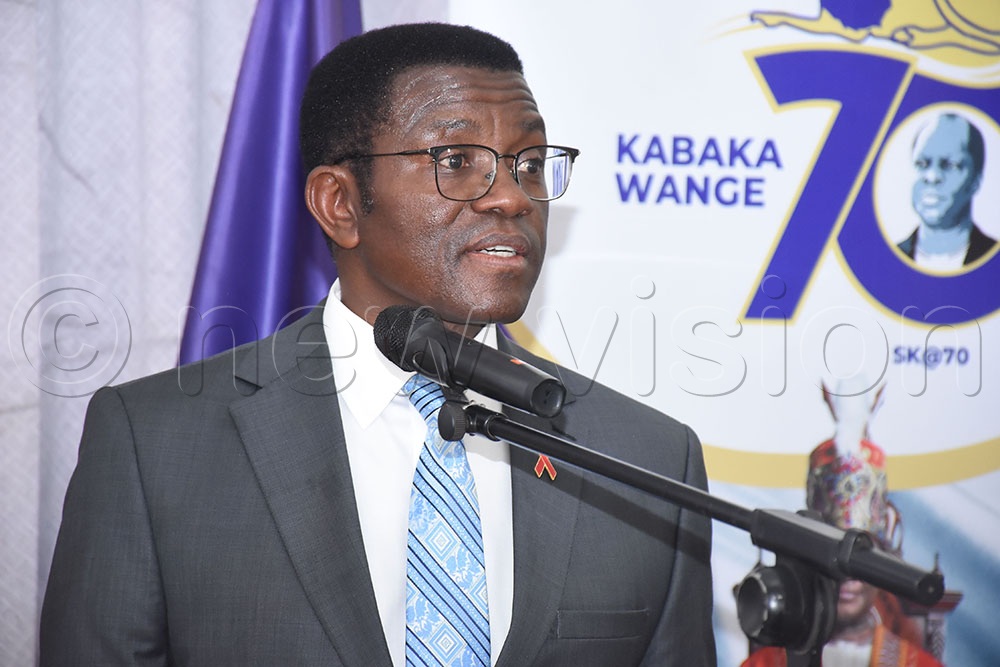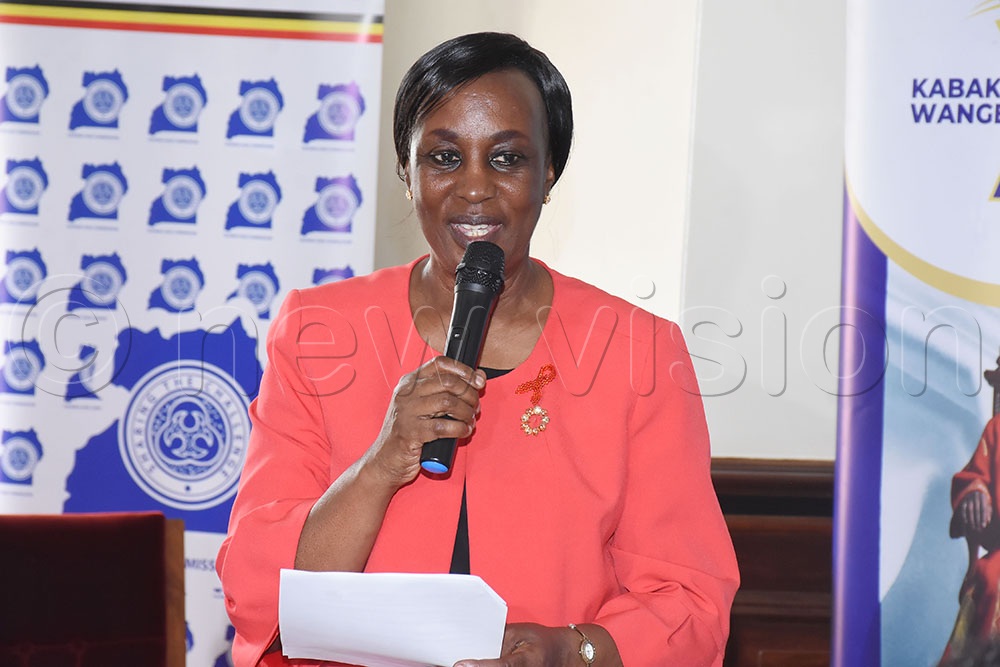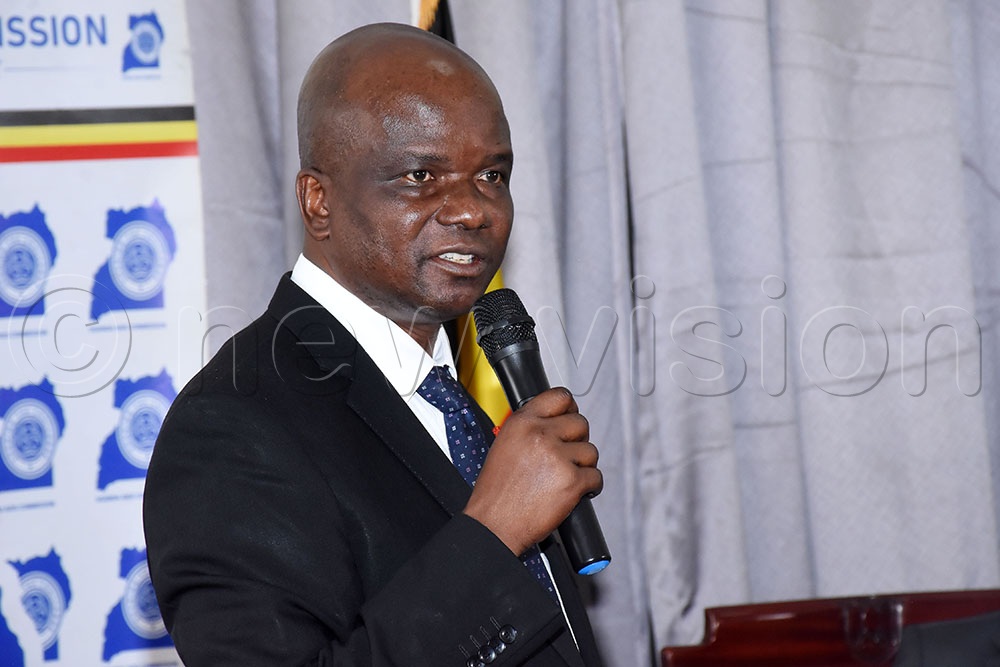Buganda kingdom applauded for tireless fight against HIV/AIDS
Dr Senyonyi commended the Buganda kingdom for its strong collaboration with the Uganda AIDS Commission in the HIV response.
During a high-level meeting at Bulange Mengo between officials from the Uganda AIDS Commission, the Katikiro and the Buganda Cabinet, she emphasised the impact of the Kingdom’s contribution. (Credit: Agnes Kyotalengerire)
The Kabaka of Buganda, Ronald Muwenda Mutebi II, has been recognised for his dedication to ending AIDS as a public health threat by 2030.
The board chairperson of the Uganda AIDS Commission, Canon Dr Ruth Senyonyi, on November 14, 2025, presented the award to the Katikiro of Buganda, Charles Peter Mayiga, who received it on the Kabaka’s behalf.
Dr Senyonyi commended the Buganda kingdom for its strong collaboration with the Uganda AIDS Commission in the HIV response.
During a high-level meeting at Bulange Mengo between officials from the Uganda AIDS Commission, the Katikiro and the Buganda Cabinet, she emphasised the impact of the Kingdom’s contribution.
According to her, "It is huge, it is big, it has had impact, and that is why we are here to show the world that what you have done is not in vain."
Katikkiro Charles Peter Mayiga expressed appreciation for the partnership with the Uganda AIDS Commission, describing the agency as one committed to improving the health of Ugandans. (All Photos by Agnes Kyotalengerire)
Uganda AIDS Commission shared key updates on the Kingdom’s role in the national HIV response. Following the launch of the Presidential Fast-Track Initiative in 2017, HIV prevalence dropped significantly from 18% in the 1990s to the current 4.9%.
The director general of the Uganda AIDS Commission, Dr Nelson Musoba, said the Commission has partnered with the Buganda Kingdom under the leadership of the Kabaka to strengthen HIV programmes.
He also praised the Kabaka for his role as a goodwill ambassador for UNAIDS and for launching the advocacy campaign titled "Men are stars."
The campaign aimed to mobilise men and boys to access HIV services, with a focus on boys aged 15 and males aged 15 to 49 in 25 high-burden districts. It reached large audiences through popular sporting events such as the Kabaka Birthday Run and the Masaza Football Cup.
Dr Musoba highlighted the kingdom’s further contribution through its media platforms, including radio and television, which have consistently disseminated HIV awareness messages.

Canon Dr Ruth Senyonyi, the board chairperson Uganda AIDS Commission, addressing guests at Bulange Mengo.
He said this effort created a multiplier effect within communities in Buganda and across the country.
In Buganda region, HIV prevalence declined from 7.6% in 2020 to 6.3% in 2024. New infections also reduced from 6.7 to 6.3 within the same period. However, Dr Musoba noted persistently high prevalence levels in districts such as Kyotera, Lwengo, Masaka city and Buikwe.
He added that Kyotera remains the leading district in new infections, followed by Wakiso and districts surrounding Kampala and Mukono.
He said the data should prompt deeper discussion and encourage leaders to engage more closely with frontline actors. The Uganda AIDS Commission will hold follow-up meetings to track progress and develop a more robust plan for 2026.
Katikkiro Charles Peter Mayiga expressed appreciation for the partnership with the Uganda AIDS Commission, describing the agency as one committed to improving the health of Ugandans.
He said that under the guidance of the Kabaka, the Kingdom has maintained the fight against HIV and continues to use the Kabaka’s birthday theme to rally communities until HIV is eliminated as a public health threat by 2030.

The Director General of Uganda AIDS Commission, Dr Nelson Musoba, addressing guests at Bulange Mengo.
The minister for social affairs in Buganda kingdom, Cotilda Nakate, pledged to use the available HIV data to intensify community sensitisation and ensure that subjects fully engage in efforts to curb the epidemic.
As part of the World AIDS Day commemoration on December 1, 2025, she announced that the Kingdom has organised a fitness activity beginning at 4:00 am, followed by a message from the Katikkiro of Buganda, Charles Peter Mayiga. According to her, "We shall keep very vigilant to ensure the fight is brought to an end with victory."
Officials from the Uganda AIDS Commission and the Buganda kingdom have signed an agreement to contribute towards ending HIV as a public health threat by 2030.
Nationally, HIV prevalence stands at 4.9%, according to the 2025 national HIV estimates report. In 2024, Uganda recorded 37,000 new HIV infections and 20,000 AIDS-related deaths. By December 2024, an estimated 1.5 million Ugandans were living with HIV.